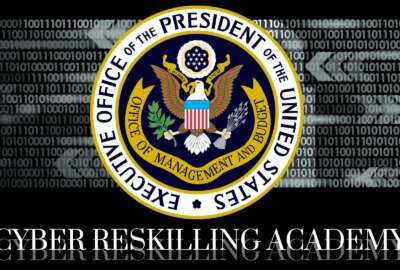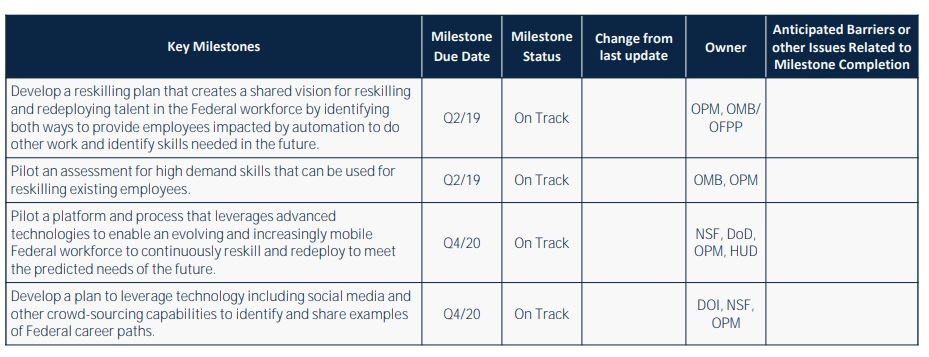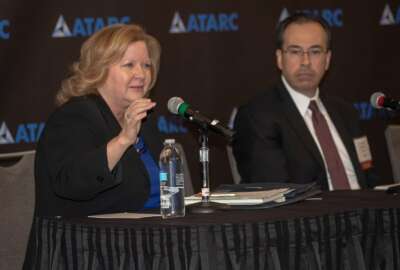

The Defense HR Activity released a RFI seeking industry input across areas like software to recruit, retain and train employees or new approaches to performance...
The Trump administration’s initiative to reskill and retrain federal workers is picking up steam.
Federal Chief Information Officers Suzette Kent announced last week that the Federal Cyber Reskilling Academy received more than 1,500 applications, of which half of the employees were GS-5 to GS-11s.
Federal Cyber Reskilling Academy applicants are completing assessments through the end of the day today and we look forward to having the inaugural class begin April 15th!
— Suzette Kent (@SuzetteKent45) March 1, 2019
Kent launched the academy in November to address the shortage of cybersecurity expertise across government through hands-on training. The first class is expected to hold 25 people who will be given a “cyber essentials” course, followed by four weeks of “follow-on learning, exercises and exams” over a four-month period.
At the same time, the Defense HR Activity issued a RFI for industry and other experts to submit white papers around six topics:
“The key area of focus for this requirement is to gather information on industry best practices in the talent management and talent development arena and explore the new and future technology to support competency gap identification, employee re-skilling and agile workforce career management, while enacting best practices to elevate employee experience and engagement,” the RFI states.
Responses are due March 15.
The Defense HR Activity may be a part of the Trump administration’s broader effort to modernize the workforce, which is a key cross-agency priority goal under the President’s Management Agenda.
In December, the cross-agency goal leaders reported “OMB and the Office of Personnel Management are working with agencies to analyze workforce data and develop reskilling plans and test methods to reskill and redeploy existing federal talent. Interactive tools to assist executives, managers and employees are currently under development including a reshaping playbook, a reskilling toolkit and video vignettes featuring agency successful practices.”

Additionally, the goal leaders say agencies want better technology and automation tools to make career paths easier to understand for employees.
“Respondents noted that career paths have the potential to yield improved outcomes in recruitment, retention, succession planning, talent development and reskilling. An industry day is planned for January 2019 to engage leading private sector career-pathing providers to explore how to better serve agency and employee needs, preferably through an enterprise service available to all agencies,” the goal leaders write.
Additionally, the National Science Foundation launched a reskilling challenge soliciting prototypes that NSF — and later all of government — can use to match existing federal employees and their skills to other kinds of work.
Public and private sector experts say agencies can move thousands of people out of low-value work and use automation to make up for that work.
OMB estimated in 2018 that about five percent of all federal occupations could be automated entirely, while 60 percent of all occupations could have at least 30 percent of their work automated. Overall, OMB says 45 percent of all “total work activities” could be automated.
Deloitte’s Center for Government Insights found government has the potential to free up anywhere from 266 million hours to 1.1 billion hours a year by retraining employees and using automation.
The appetite and potential for federal employees to move into new fields, whether it’s cybersecurity, data science or many of the other emerging occupations is real. The administration shouldn’t waste this opportunity because of big “P” politics and reach out to House lawmakers and employee union officials. The reality is change is happening, it’s just a matter of how quickly it can come and if OMB and OPM aren’t inclusive and strategic about all of this potentially impactful and needed work, agencies either will be stuck manually inputting data into Excel spreadsheets or they will make change on their own, which tends miss the important point of moving everyone forward together.
Copyright © 2025 Federal News Network. All rights reserved. This website is not intended for users located within the European Economic Area.
Jason Miller is executive editor of Federal News Network and directs news coverage on the people, policy and programs of the federal government.
Follow @jmillerWFED


